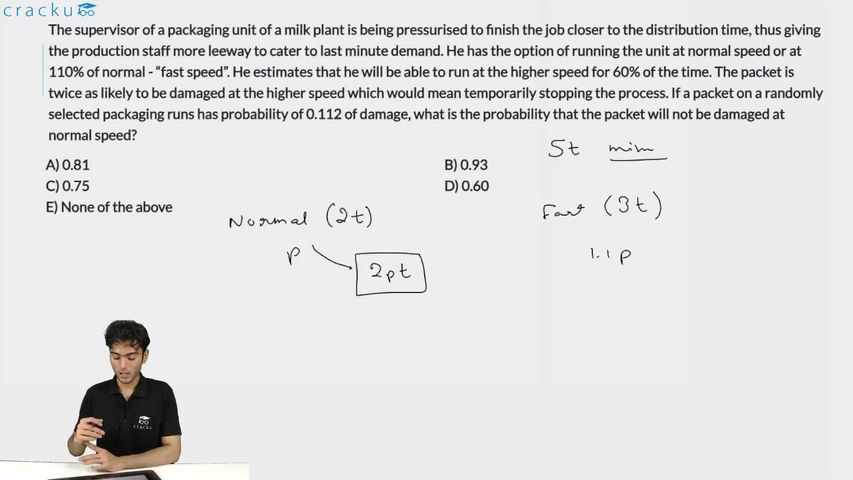The supervisor of a packaging unit of a milk plant is being pressurised to finish the job closer to the distribution time, thus giving the production staff more leeway to cater to last minute demand. He has the option of running the unit at normal speed or at 110% of normal - “fast speed”. He estimates that he will be able to run at the higher speed for 60% of the time. The packet is twice as likely to be damaged at the higher speed which would mean temporarily stopping the process. If a packet on a randomly selected packaging runs has probability of 0.112 of damage, what is the probability that the packet will not be damaged at normal speed?
Solution
Let $$p \times \frac{0.34 mt}{mt}$$m packets of milk be prepared in unit time at the normal speed.
Now, at normal speed in $$t$$ time, the number of packets of milk that would be produced = $$mt$$
=> Number of packets of milk produced at fast speed = $$(\frac{110}{100} \times m) + (\frac{60}{100} \times t) = 0.66 mt$$
The target for the supervisor = $$mt$$ packets
Number of packets produced at normal speed = $$mt - 0.66 mt = 0.34 mt$$
Let the probability of a packet being damaged when produced at normal speed = $$p$$
=> Probability that a packet is damaged when produced at fast speed = $$2p$$
The probability that a packet selected at random will be damaged = 0.112
=> $$(p \times \frac{0.34 mt}{mt}) + (2p \times \frac{0.66 mt}{mt}) = 0.112$$
=> $$0.34p + 1.32p = 1.66 p = 0.112$$
=> $$p = \frac{0.112}{1.66} = 0.067$$
$$\therefore$$ Probability that a packet will not be damaged at normal speed = $$1 - 0.067 = 0.93$$
Video Solution

Click on the Email ☝️ to Watch the Video Solution
Create a FREE account and get:
- All Quant Formulas and shortcuts PDF
- 15 XAT previous papers with solutions PDF
- XAT Trial Classes for FREE
